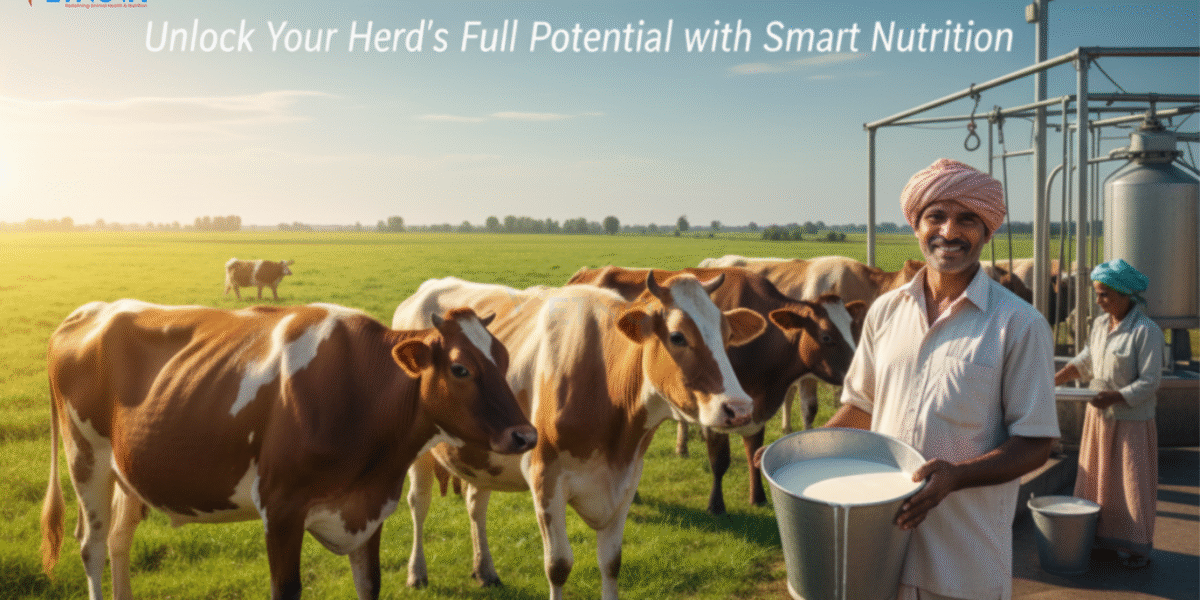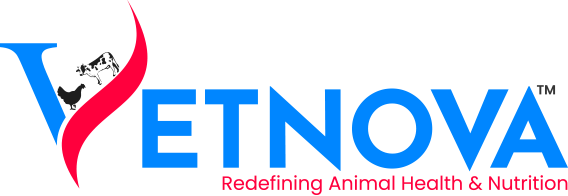Unlocking Peak Milk Production: The Ultimate Guide to Supplements for Dairy Cows
For every dairy farmer in India, from the rolling hills of Punjab to the lush pastures of West Bengal, the goal is the same: a healthy, productive herd that yields high-quality milk. You invest in the best fodder and provide excellent care, but sometimes the results don’t match the effort. The secret to bridging this gap often lies not in more feed, but in smarter feed. This is where the strategic use of supplements for dairy cows becomes a game-changer, turning good nutrition into great performance.
This guide will walk you through the essentials of milk cow nutrition, explaining why supplementation is critical and how the right approach can significantly boost both milk quantity and quality.
- Why Standard Feed Isn't Always Enough: The Need for Dairy Cattle Nutrition
- Understanding Dairy Cow Nutrition Requirements
- The Role of a High-Quality Mineral Mixture for Dairy Cows
- Key Supplements to Increase Milk Production in Cows
- How to Increase SNF in Milk for Better Quality
- Choosing the Right Supplements for Dairy Cows

Why Standard Feed Isn’t Always Enough: The Need for Dairy Cattle Nutrition?
It’s easy to assume that as long as a cow is well-fed, it’s getting everything it needs. However, the nutritional demands of modern, high-yielding dairy cows are immense, and the feed itself can have hidden deficiencies.
The core of effective dairy cattle nutrition is understanding that quality matters as much as quantity. Factors like soil depletion can mean that the fodder grown, even if it looks healthy, may lack the essential minerals it once had. Furthermore, the stress of lactation, pregnancy, and environmental changes drastically increases a cow’s nutritional needs. Relying on feed alone can lead to subtle deficiencies that cap your herd’s potential and can lead to long-term health issues.
Understanding Dairy Cow Nutrition Requirements
Before diving into supplements, it’s crucial to understand the foundational needs of a dairy cow. A balanced diet is a pyramid built on several key components, and overlooking any one of them can affect the entire structure.
Meeting the complete dairy cow nutrition requirements involves a careful balance of the following:
Energy: The fuel for all bodily functions, including milk production. Sources include grains like maize, barley, and quality silage. A lack of energy is the most common reason for low milk yield.
Protein: Essential for muscle development, immune function, and creating the protein component of milk. Sources include soybean meal, groundnut cake, and high-quality legumes.
Fibre: Crucial for proper rumen function and digestion. Good quality hay and fodder are the primary sources, ensuring the cow’s digestive system runs smoothly.
Minerals & Vitamins: These are the spark plugs of the cow’s metabolic engine. While needed in smaller amounts, their absence can cause major problems, from poor fertility to weak bones and a compromised immune system.
The Role of a High-Quality Mineral Mixture for Dairy Cows
This is where supplementation truly begins to shine. Because minerals are so vital yet often lacking in standard diets, providing a dedicated supplement is the most effective way to ensure your herd is covered.
A balanced mineral mixture for dairy cow’s acts as a daily insurance policy, filling in the nutritional gaps left by regular feed. These mixtures provide a scientifically formulated blend of macro-minerals (like calcium and phosphorus) and trace minerals (like copper, zinc, and selenium) that work together to support every aspect of the cow’s health. A good mixture not only prevents deficiency diseases but actively works to enhance productivity and overall well-being.
Key Supplements to Increase Milk Production in Cows
Once the foundation of energy and protein is set, specific supplements can be used to target and enhance milk output. If your goal is to see a tangible increase in the daily milk yield, focusing on the right additives is key.
Stated below are some of the most effective supplements to increase milk production in cows, each playing a distinct and powerful role:
The King of Minerals: Calcium Supplements for Cows
Milk is incredibly rich in calcium, and a high-yielding cow drains a massive amount from its body every day. If her diet doesn’t replenish this, her body will pull calcium from her bones, leading to weakness and a higher risk of metabolic diseases like milk fever, especially around calving. Providing high-quality calcium supplements for cows is non-negotiable for maintaining skeletal health and directly fuelling high milk volume.
Energy Boosters for Higher Yield: Rumen bypass fat
Supplements like bypass fat act as dense energy sources. They “bypass” the rumen and are digested in the small intestine, providing a direct, powerful energy boost that can be channeled straight into milk production without upsetting the digestive system. This is a proven method for increasing the overall energy density of the diet.
The Power of Bioavailable Trace Minerals
Minerals like Zinc, Copper, and Manganese are essential for enzyme function, immunity, and reproductive health. However, for them to work, they must be absorbed. Advanced supplements use chelated minerals, where the mineral is attached to an amino acid. This protects it in the digestive tract and allows for vastly superior absorption compared to standard inorganic minerals. The form of the mineral matters greatly, as the difference in absorption between organic and inorganic sources is significant.
Beyond Quantity: How to Increase SNF in Milk for Better Quality
Getting more milk is only half the battle; getting better quality milk often fetches a higher price. Solids-Not-Fat (SNF) is a key measure of milk quality, composed of protein, lactose, and minerals. Many farmers wonder how to increase SNF in milk, and the answer lies in fine-tuning nutrition.
A drop in SNF is often linked to an energy deficit or an imbalance in the diet. To improve it, ensure the cow’s energy needs are fully met. Furthermore, providing highly bioavailable minerals is critical, as minerals are a direct component of SNF. When a cow absorbs more essential minerals, it has the raw materials needed to produce higher-quality milk. This demonstrates that a superior mineral mixture for dairy cows can impact not just yield, but the final composition and value of the milk.
Choosing the Right Supplements for Dairy Cows
With so many options available, selecting the right supplement can be overwhelming. The key is to focus on quality, bioavailability, and proven results rather than just price.
When choosing supplements for dairy cows, look for products from reputable manufacturers with quality certifications (like FAMI-QS or WHO-GMP). Prioritize supplements that use chelated, bioavailable minerals to ensure your animals get the maximum benefit from every gram. Consulting with a veterinarian or an animal nutritionist can provide personalized recommendations that meet your herd’s specific needs and help you achieve your production goals.
Click here to know more about feed wastage issue.
Conclusion
Optimizing milk cow nutrition is one of the most powerful investments a farmer can make. It goes beyond simply feeding cows more; it’s about feeding them smarter. By understanding the core dairy cow nutrition requirements and strategically using high-quality supplements to fill the gaps, you can unlock the full genetic potential of your herd. This leads to healthier animals, higher milk yields, better quality milk, and ultimately, a more profitable and sustainable farm.
The best approach is to mix supplements with the daily concentrate feed. This ensures consistent intake every day. For certain needs, like high-demand periods around calving, a veterinarian may recommend specific oral supplements like calcium gels.
While any mixture is better than none, not all are created equal. A high-quality mineral mixture for dairy cows will have a balanced profile and use more bioavailable mineral forms (like chelates) that are better absorbed by the animal, leading to superior results.
While some effects like improved energy can be seen within a week or two, tangible results in milk yield and quality typically become noticeable after 3-4 weeks of consistent use, as the cow’s nutritional status improves.
The first step in understanding how to increase SNF in milk is to assess the cow’s energy intake. Ensure she is receiving enough high-quality fodder and concentrate. After that, introducing a supplement with highly bioavailable minerals and consulting a nutritionist can help correct the specific deficiency.
At the onset of lactation, a cow’s demand for calcium skyrockets to produce colostrum and milk. This can overwhelm her body’s ability to mobilize calcium from her bones, leading to a dangerous drop in blood calcium levels (milk fever). Supplementing before and after calving prevents this.
The absolute basics are ensuring adequate energy, protein, and clean water. Beyond that, providing a balanced source of fiber for rumen health and a complete mineral and vitamin supplement is essential for meeting the full dairy cow nutrition requirements for health and production.
